
Ethanol is a good substitute to deal with the problem of growing oil-driven energy crisis. Its use is currently restricted and is only used as a fuel additive to improve gasoline combustibility.
Engineers have been continuously trying to find new methods to boost the production of ethanol. The major problem encountered is that high ethanol levels are toxic to the yeast that ferments corn and other plant material into ethanol.
Hal Alper, a postdoctoral associate in the laboratories of MIT chemical engineering professor Gregory Stephanopoulos and Whitehead Member Gerald Fink have discovered a new method that boosts the ethanol production by 50%.
In an experiment, they made use of TATA-binding protein to alter transcription factor by manipulating the yeast genome and developed a new strain of yeast that can tolerate elevated levels of both ethanol and glucose.
The proteins used in the experiment have a characteristic to control large number of genes and hence caused the over-expression of at least a dozen genes, all of which were found to be necessary to elicit an improved ethanol tolerance.
This invention will certainly find application in producing industrial yeast. Ethanol production is much cheaper as compared to other fuels processing and will play vital role in U.S. energy supply in coming future.
Via: Physorg




